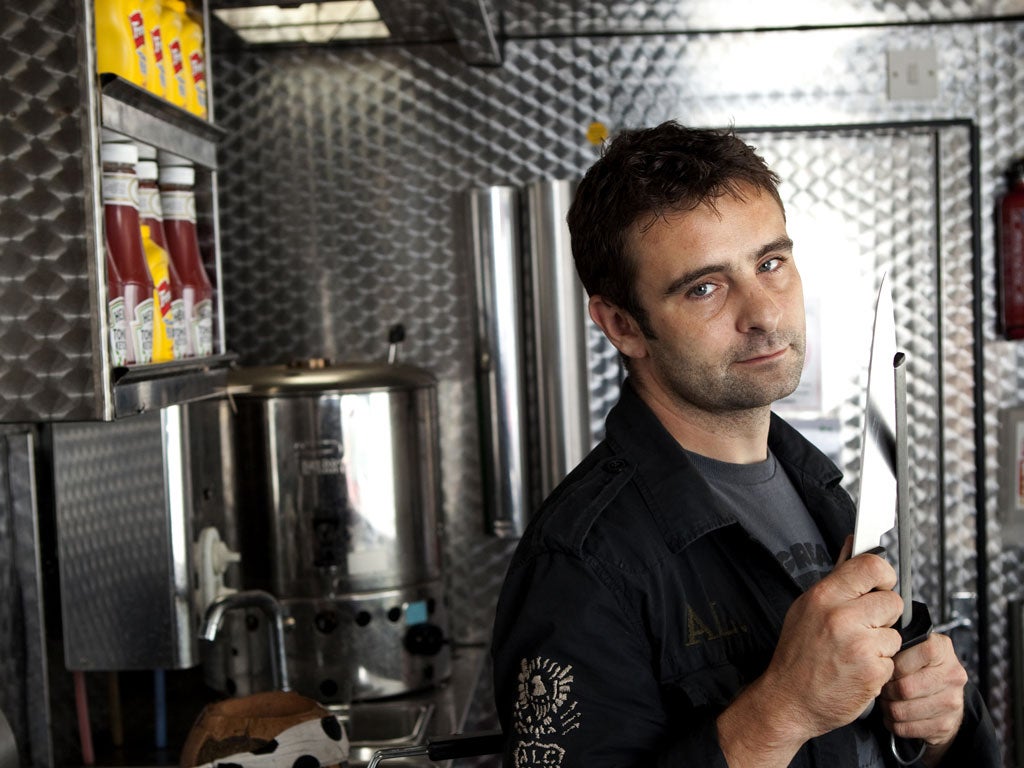Trending: The knives are in
When did cooking get so cool? Tim Walker traces the rise of the hip young panslingers

Your support helps us to tell the story
From reproductive rights to climate change to Big Tech, The Independent is on the ground when the story is developing. Whether it's investigating the financials of Elon Musk's pro-Trump PAC or producing our latest documentary, 'The A Word', which shines a light on the American women fighting for reproductive rights, we know how important it is to parse out the facts from the messaging.
At such a critical moment in US history, we need reporters on the ground. Your donation allows us to keep sending journalists to speak to both sides of the story.
The Independent is trusted by Americans across the entire political spectrum. And unlike many other quality news outlets, we choose not to lock Americans out of our reporting and analysis with paywalls. We believe quality journalism should be available to everyone, paid for by those who can afford it.
Your support makes all the difference.Eating at the best restaurants used to be so much more straightforward: you checked the reviews in the Michelin Guide, then your secretary called to demand a banquette in the corner. You had to be wealthy, of course, and well-connected. And if you were neither, then you had to save your pennies for the next six months, while you waited for that reservation at the table by the loos. Now, though, the hottest joint in town is on Twitter; it's filled with 20-somethings who've little more than £20 in their pockets; and, no matter how wealthy or well-connected you are, you'll probably have to queue for a table. Eating out has become something that young people do. It is, for want of a better term, cool.
Tonight the first annual Young British Foodies awards in London will bestow upon a group of young chefs, bartenders and producers such titles as "Charcuterie Personality of the Year" and "Most Irreverent Young Chef". One of its organisers compares the YBFs to the YBAs of the 90s art scene, on account of their creativity and the challenge they pose to the established order. Restaurants have been described as the new rock'n'roll since the days of Marco-Pierre White, but the YBFs' clientele really could be off to a gig when they finish their ribs. As with music, they're always in search of something new, and they earn prestige from sharing it with their friends – tweeting Instagram pics of their appetisers, for example. By the time too many people have eaten there, they're on to the next place.
"Good food has become cheaper," says chef James Lowe, 32, who until recently cooked at The Young Turks, a pop-up above The Ten Bells pub in east London. "In the past, what constituted good food was decided by the Michelin Guide, and they only addressed the higher end. Now we think more democratically about good food; good food can be a burger." (The identity of the best burger in London is hotly contested: is it the "dead hippie" at Meat Liquor in W1? Or is it Lucky Chip's "Bill Murray Life Aquatic Surf and Turf" at the Sebright Arms in Hackney?)
The godfather of the new London restaurant scene is Russell Norman, whose first restaurant, Polpo, opened in 2009. Like many of its imitators, Polpo doesn't take reservations. That means queueing. Tom Adams is the 23-year-old chef behind Pitt Cue, which first sold barbecued pork from a van on the South Bank, and is now a tiny restaurant in Soho, where the queue for a table can take two hours. Younger diners, he says, are more willing to wait. "We couldn't afford anywhere bigger than a 25-seater, and the only reason we don't do reservations is we'd probably only get half the amount of covers that way – and we probably wouldn't be in business anymore."
Adams admits the queue for a table brings cachet, like a six-month wait for a reservation once did. It's possible to foresee a future where restaurants split into an ageing establishment and a counterculture, where newspapers review the latest high-profile opening as if it were opera, while bloggers line up for the latest scuzzy burger show. "It's annoying that food has trends and fashions, but it does," says Lowe. "Part of what's popular now will become established, but perhaps people will get fed up with the trends and say, 'Actually, I fancy a big white tablecloth, and why do I only have one waiter? Get me three!'"
Join our commenting forum
Join thought-provoking conversations, follow other Independent readers and see their replies
Comments